Top Rankings
Cheney School District ranks among the top 20% of public school district in Kansas for:
Category
Attribute
Overall Rank
Highest overall rank (Top 5%)
Math Proficiency
Highest math proficiency (Top 5%)
Reading/Language Arts Proficiency
Highest reading/language arts proficiency (Top 5%)
Science Proficiency
Highest science proficiency (Top 10%)
Graduation Rate
Highest graduation rate (Top 10%)
For the 2025 school year, there are 3 public schools serving 810 students in Cheney School District. This district's average testing ranking is 10/10, which is in the top 5% of public schools in Kansas.
Public Schools in Cheney School District have an average math proficiency score of 55% (versus the Kansas public school average of 30%), and reading proficiency score of 50% (versus the 33% statewide average).
Minority enrollment is 10% of the student body (majority Hispanic), which is less than the Kansas public school average of 39% (majority Hispanic).
Overview
This School District
This State (KS)
# Schools
3 Schools
1,340 Schools
# Students
810 Students
477,627 Students
# Teachers
57 Teachers
33,417 Teachers
Student : Teacher Ratio
14:1
14:1
District Rank
Cheney School District, which is ranked within the top 5% of all 286 school districts in Kansas (based off of combined math and reading proficiency testing data) for the 2021-2022 school year.
The school district's graduation rate of 90-94% has increased from 90% over five school years.
Overall District Rank
#6 out of 286 school districts
(Top 5%)
(Top 5%)
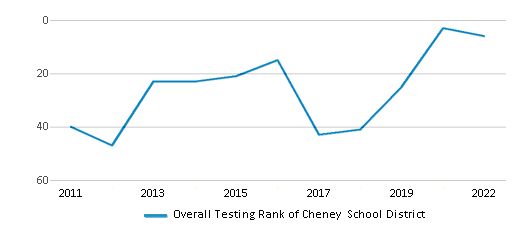
Math Test Scores (% Proficient)
55%
29%
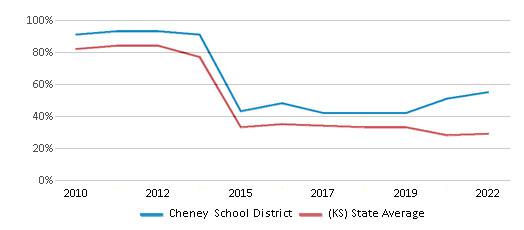
Reading/Language Arts Test Scores (% Proficient)
52%
32%
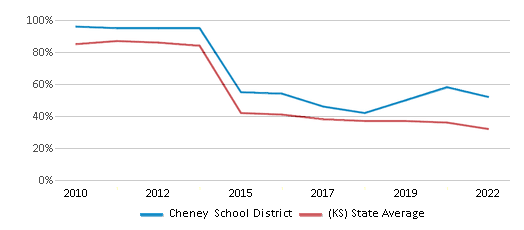
Science Test Scores (% Proficient)
45-49%
31%
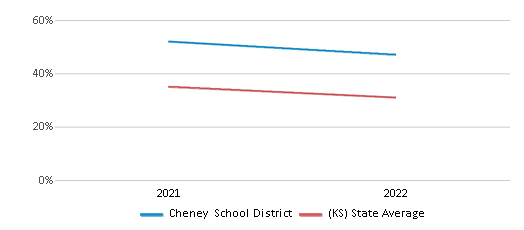
Graduation Rate
90-94%
89%
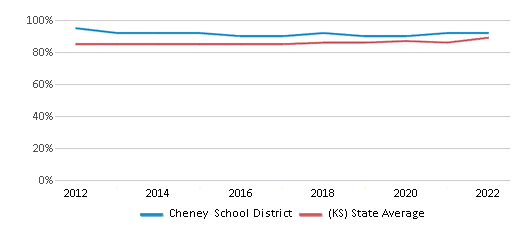
Students by Ethnicity:
Diversity Score
0.19
0.57
# American Indian Students
5 Students
3,553 Students
% American Indian Students
n/a
1%
# Asian Students
n/a
13,530 Students
% Asian Students
n/a
3%
# Hispanic Students
47 Students
104,522 Students
% Hispanic Students
6%
22%
# Black Students
7 Students
31,245 Students
% Black Students
1%
7%
# White Students
727 Students
293,371 Students
% White Students
90%
61%
# Hawaiian Students
n/a
1,139 Students
% Hawaiian Students
n/a
n/a
# Two or more races Students
24 Students
30,267 Students
% of Two or more races Students
3%
6%
Students by Grade:
# Students in PK Grade:
66
21,787
# Students in K Grade:
45
31,674
# Students in 1st Grade:
44
32,919
# Students in 2nd Grade:
54
34,119
# Students in 3rd Grade:
59
33,302
# Students in 4th Grade:
61
34,287
# Students in 5th Grade:
67
34,416
# Students in 6th Grade:
63
35,078
# Students in 7th Grade:
61
35,096
# Students in 8th Grade:
54
36,357
# Students in 9th Grade:
62
37,517
# Students in 10th Grade:
58
37,330
# Students in 11th Grade:
59
36,547
# Students in 12th Grade:
57
34,737
# Ungraded Students:
-
2,461
District Revenue and Spending
The revenue/student of $14,475 in this school district is less than the state median of $16,276. The school district revenue/student has stayed relatively flat over four school years.
The school district's spending/student of $12,840 is less than the state median of $17,192. The school district spending/student has stayed relatively flat over four school years.
Total Revenue
$12 MM
$7,774 MM
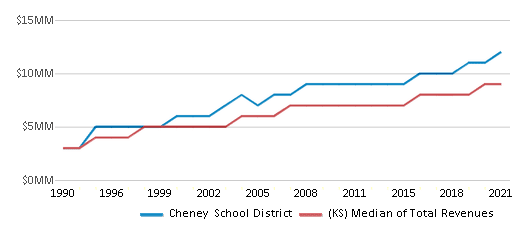
Spending
$10 MM
$8,211 MM
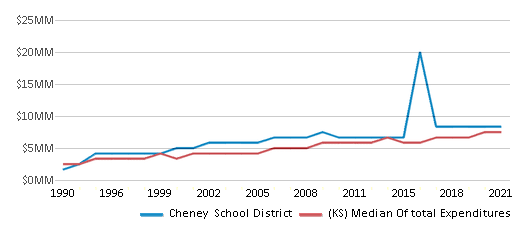
Revenue / Student
$14,475
$16,276
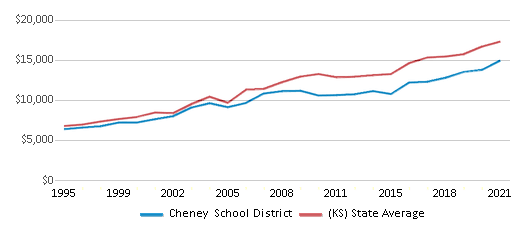
Spending / Student
$12,840
$17,192
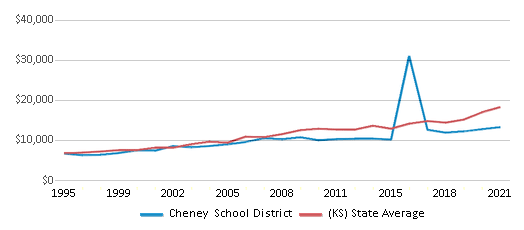
Best Cheney School District Public Schools (2025)
School
(Math and Reading Proficiency)
(Math and Reading Proficiency)
Location
Grades
Students
Rank: #11.
Cheney Elementary School
(Math: 70-74% | Reading: 65-69%)
Rank:
Rank:
10/
Top 5%10
126 W 5th
Cheney, KS 67025
(316) 542-3137
Cheney, KS 67025
(316) 542-3137
Grades: PK-5
| 396 students
Rank: #22.
Cheney Middle School 6-8
(Math: 40-44% | Reading: 40-44%)
Rank:
Rank:
8/
Top 30%10
715 N. Main
Cheney, KS 67025
(316) 542-0060
Cheney, KS 67025
(316) 542-0060
Grades: 6-8
| 178 students
Rank: #33.
Cheney High School
(Math: 40-44% | Reading: 20-24%)
Rank:
Rank:
6/
Top 50%10
800 N Marshall
Cheney, KS 67025
(316) 542-3113
Cheney, KS 67025
(316) 542-3113
Grades: 9-12
| 236 students
Frequently Asked Questions
How many schools belong to Cheney School District?
Cheney School District manages 3 public schools serving 810 students.
What is the rank of Cheney School District?
Cheney School District is ranked #9 out of 286 school districts in Kansas (top 5%) based off of combined math and reading proficiency testing data for the 2021-2022 school year. This district ranks in the top 20% of Kansas school districts for: Highest overall rank (Top 5%), Highest math proficiency (Top 5%), Highest reading/language arts proficiency (Top 5%), Highest science proficiency (Top 10%) and Highest graduation rate (Top 10%)
What is the racial composition of students in Cheney School District?
90% of Cheney School District students are White, 6% of students are Hispanic, 3% of students are Two or more races, and 1% of students are Black.
What is the student/teacher ratio of Cheney School District?
Cheney School District has a student/teacher ratio of 14:1, which is equal to the Kansas state average of 14:1.
What is Cheney School District's spending/student ratio?
The school district's spending/student of $12,840 is less than the state median of $17,192. The school district spending/student has stayed relatively flat over four school years.
Recent Articles

Year-Round Or Traditional Schedule?
Which is more appropriate for your child? A year-round attendance schedule or traditional schedule? We look at the pros and cons.

Why You Should Encourage Your Child to Join a Sports Team
Participating in team sports has a great many benefits for children, there is no doubt. In this article you will learn what those benefits are.

White Students are Now the Minority in U.S. Public Schools
Increasing birth rates among immigrant families from Asia and Central and South America, combined with lower birth rates among white families, means that for the first time in history, public school students in the United States are majority-minority. This shift in demographics poses difficulties for schools as they work to accommodate children of varying language abilities and socio-economic backgrounds.





